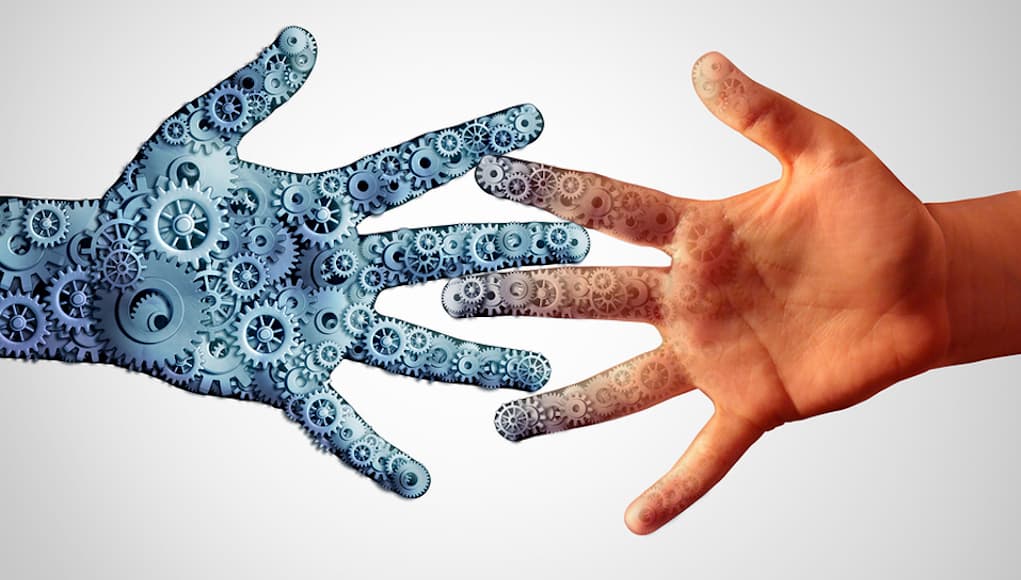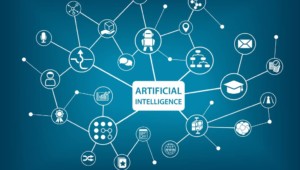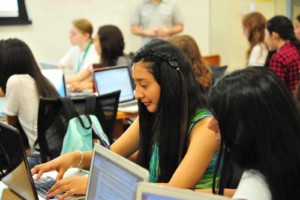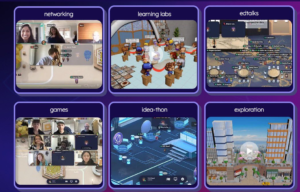Education is about to radically change: AI for the masses
Key Points
-
AI already does and will continue to impact education – along with every other sector.
-
Innovative education leaders have an opportunity to build the foundation for the most personalized learning system we have ever seen.

Over the last week, millions of people have tried the new AIchat release from OpenAI, built on an upgrade to GPT3 (Generative Pre-trained Transformer). The tool uses a neural network to generate responses from data sources from the internet. OpenAI, supported by Microsoft, also built and released the currently free DALL-E – AI-generated art. By creating an easy user interface, the ChatGPT likely has many educators wondering about the future of learning. This platform, based on GPT3 models, will be rapidly improved when next-generation GPT4 models emerge in the next 1-2 years – meaning, it’s only going to get better
AI already does and will continue to impact education – along with every other sector. Innovative education leaders have an opportunity (along with parallel emerging innovations in Web3) to build the foundation for the most personalized learning system we have ever seen. Using these tools, educators can design an equitable and efficient model for every learner to find purpose and agency in their lives – and the opportunity to help solve some of the world’s most pressing challenges.
AIChat Innovation
Artificial intelligence and/or machine learning are sets of code that build new understanding from existing underlying data. Unlike search engines (such as Google or Safari), AI machines can take huge amounts of data and predict, with strong accuracy, helpful and relevant responses (acknowledging here that plenty of stories came out this week of interesting responses from testing the new OpenAI release).
ChatGPT builds on the existing OpenAI platform by including responsiveness. ChatGPT remembers prior conversations so that it can build on previous responses. Vastly different from the first-generation help bots we all experience with online help desks, this step up creates a more natural, interactive and helpful conversation to support both learners and educators.
AI already does and will continue to impact education – along with every other sector.
Nate McClennen and Rachelle Dené Poth
Potential
- Personalized. Personalized learning, where every student gets what they need, how they need it, and when they need it, increases chances of long-term success (i.e. family-sustaining wage, contributing citizenship, positive mental health). ChatGPT, can suggest next steps to any learning challenge at multiple levels of complexity. For example, if a student does not understand derivatives in Calculus, a simple search for “Explain derivatives using everyday terms” or “Provide step-by-step processes for solving derivative calculations” can instantly support a student where they are. As AI becomes more sophisticated, this can be in multiple modalities and media formats. The demand and evidence in support for 1:1 tutoring have risen dramatically to account for Covid losses and learning gaps. Personalized AI Tutors can address this issue.
- Access. Hundreds of millions of learners of all ages do not have access to quality education. Sophisticated AI tutors, built into simple and affordable platforms, can solve this challenge for those who have access to mobile devices. For example, students can ask for clarification on a concept they are studying and receive immediate responses via an AI tutor. Access to immediate support will help to limit and hopefully eliminate lost learning opportunities.
- Purpose. Through more efficiency in the learning process, and more personalization, more energy in learning spaces can be focused on purpose-driven work connected to complex and unpredictable challenges such as those described in Global Goals for Sustainable Development.
- Assessment. If you feed a piece of writing into ChatGPT and ask it to make recommendations for improvement, it will respond accordingly and then continue to guide the user through the revision process. Imagine formative assessment completed by ChatGPT and the time it would save educators to focus on relationships and create high engagement learning. ChatGPT can create rubrics when prompted appropriately, and then improve on these rubrics with continued questions.
- Support and Guidance. The need for social-emotional and mental health support for young people is at an all time high. Just as 1:1 academic tutoring matters, so does the availability of counselors and mentors. ChatGPT, especially when combined with AR/VR technology, may serve as the front-line counselors for those who need it the most. Additionally, the use of ChatGPT could provide students with immediate access to resources for career and college planning, for seeking advice and other benefits that can come from having access to a counselor – especially given the overwhelming student numbers assigned to most school counselors.
- Learning Design. Innovative learning experiences can take significant time (think high-quality project-based learning) to design. AI can address that challenge. Nolej, a newly launched AI platform available for beta in early 2023, can generate complete and sophisticated learning modules when fed a text, video or other media source on a topic. These modules contain tasks, assessments and eventually, AI-generated assessments to support learner growth. Future-oriented learning organizations like Sora Schools have an internal research team investigating the use of Large Language Models like ChatGPT in education. CEO Garrett Smiley says, “This has the potential to change everything. It could become a teacher’s best friend and help students create even high-quality projects. But, time will tell if that potential comes to fruition. There are still a lot of open questions.” As Seth Godin stated, “Technology begins by making old work easier, but then it requires that new work be better.”
- Coaching. Every educator (and possibly every human being) can benefit from a great coach. AIChat could provide that for teachers. Building on the solution introduced by Edthena last year, personalized coaching could be readily available for every educator. When schools lack coaches to support teachers, relying on virtual coaches helps all educators to receive feedback, to interact with a coach and build professional skills in an authentic way.
- Virtual Assistant. AIChat could act as a virtual research assistant for educators as they explore new content for courses, saving time in searching through Google and other resources. Asking AIChat to draft a lesson plan, write letters, and other communications could enable educators to redirect the time spent on these tasks toward students when AIChat is used for clerical tasks.
- Adaptive. AIChat can adjust its response and information provided as it learns more from its interactions with the user. By analyzing the questions and ongoing conversations with the user, it then analyzes the data received to provide more personalized interactions that meet the specific needs and pace of each learner. This may also support learning differences by personalizing engagement by interacting with students through conversation, providing simple or complex explanations based on student needs, and chunking information and adapting learning based on a student’s input (such as explaining in more simple or more complex terms).
Challenge
- Bias and Accuracy. AI is only as good as the data that is fed into the machine learning algorithms. OpenAI uses data from 2021 and earlier. It is already dated. Support services such as Education Technology equity certification (such as that from Digital Promise) will help platform builders increase equity. With a massive uptake in use, AI can also be self-referential, citing work that it has already generated. Consider an AI engine that asks millions of questions every second – and then publishes those to the web. The mere volume produced could impact the veracity of searches. As with all information we obtain via online searches, there is no guarantee of its reliability. Not everything we find online is true. Because AIChat is a language model, it will provide wrong answers at times, even though its responses appear to be accurate and authoritative, there will still be errors. As with all information we receive, we need to have the skills to sort through the information and check its validity.
- Literacy. If every learner has access to a tool such as OpenAI that can write close to perfect essays, it is not difficult to imagine that essay-writing, blog posting (such as this blog) and other human produced writing will go the way of cursive: interesting but perhaps deemed not critical. There is no doubt that reading may remain, but perhaps basic essay constructions will be completed by AI technology and humans may be the editors, creators, and question askers. Michael Moe at GSV describes a writing revision process using ChatGPT as a tool (rather than just to produce the final product). The challenge will be whether and how fast educators can adapt (as opposed to reducing all essay prompts to handwritten products only).
- Data privacy. As with all technologies, data privacy is paramount. If learners and educators use ChatGPT solutions, how will their input data be used beyond feeding into the data model? Schools are expressing concern about how student data is used by third parties and with technologies like this, without consent given.
- Isolation. Already technology is built to maximize use. Research suggests that users have more access but feel more isolated. If the power of human relationships is paramount, AI “friends” may increase isolation, social anxiety and mental health challenges. With the use of AIChat, users will instead collaborate with AI, rather than build interpersonal and SEL skills that are necessary for workplace success. Will AIChat be a suitable and comparable alternative to human connections?
- Ownership. If AI generates code for a computer science class, essays for an English class, and art for an art class, who owns the work? What if a student modifies it slightly? Will new solutions (whether a problem set or an invention) always be AI aided? Educators will worry about detecting plagiarism, but it may get better at being undetectable (but not impossible). There is no doubt that over the last two weeks students have submitted AI-generated solutions to assessment prompts. So, we either regress to handwriting and cursive to prove authenticity, or embrace new tools that make the process and product for every learner.
Action
Education leaders need to consider these possible futures now. There is no doubt that K-12 and higher ed learners will be using these tools immediately. It is not a question of preventing “AI plagiarism” (if such a thing could exist), but a question of how to modify teaching to take advantage of these new tools.
- Test drive AI platforms like ChatGPT and the sandbox from OpenAI.
- Have your students and/or teachers do the same. Try entering prompts and then analyzing the quality, accuracy and variability of the responses. Rapidly increase comfort level.
- Build learning around these tools and evaluate the outcome.
- Rethink assessments and the tasks you are asking students to do, they can already plagiarize and find all answers, but now, they don’t even have to paraphrase. Begin now to imagine learning with this context.
Conclusion
AI will change education in a variety of ways, from the way students learn to the way teachers teach. AI-based tools will allow students to learn faster, with more personalized instruction tailored to their individual needs. AI can also help teachers track student progress, allowing them to intervene in learning when necessary and provide more effective instruction. AI can also provide valuable insights into student performance and help teachers develop better teaching methods. AI will also help schools become smarter, with more efficient use of resources and better decision-making. Ultimately, AI can help create a more equitable, effective, and enjoyable learning environment for all students.
While we are making broad predictions in this post, imagine if every person had access to supportive AI technology that was designed with equity, access, privacy and learners at the core. ChatGPT and its successors, built on these premises, will radically change the education landscape – sooner than we think. In an increasingly distracted and disconnected world, perhaps AI can provide more quality educational access to more people in a more efficient manner to give time to collaboratively tackle some of the world’s greatest challenges.
Author’s note: Can you find the paragraph written by OpenAI in this post? If not, the Turing test was successful. Alan Turing was a mathematician who devised a test to determine a machine’s ability to imitate human behavior.
This post is part of our New Pathways campaign sponsored by American Student Assistance® (ASA), Stand Together and the Walton Family Foundation.

Nate McClennen








Jim Goodell
The article dos a good job of pointing out some technology-related challenges with AI. The greater challenges come from the organizational culture and practice changes that would be needed to fully embrace personalized AI-enabled adaptive self-improving systems of learning. I'm afraid that a lot of energy will be wasted arguing about how to prevent cheating with AI tools and relatively little energy given to how to re-engineer eduction to prepare students for success in a changed world where facts are instantly available but not always true, the human experience is different, and the work humans do in partnership with AI agents is radically different than the what schools are currently preparing students for.
Justin Roberts
AI-powered personalized learning systems that are flexible and self-improving. I fear that rather than focusing on how to re-engineer education to prepare students for success in a changed world where facts are instantly available but not always true, the human experience is different, and the work humans do in partnership with AI agents is drastically different from what schools are currently preparing students for, a lot of energy will be wasted debating how to prevent cheating with AI tools.